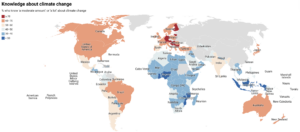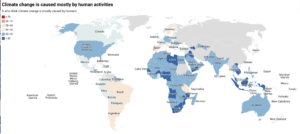If you’re working to inform and empower your Club and networks to take action on the climate crisis, check out International Public Opinion on Climate Change, a new report released Nov. 14 by the Yale Program on Climate Change Communication, Meta’s Data for Good, and Rare’s Center for Behavior and the Environment.
The report is based on a survey they conducted from Aug. 3-Sept. 3, 2023 of Facebook users in nearly 190 countries and territories worldwide on “public climate change knowledge, attitudes, policy preferences, and behavior.” The appendix breaks out answers by six regions – such as Europe, Southwest Asia/North Africa, and Sub-Saharan Africa – and the individual nations within each.
YPCCC also offers a free 10-part email course on effective climate change communications with American audiences. More on that below.
Here is YPCCC’s overview of the findings:

Used with permission from Yale Program on Climate Change Communication
“The study finds generally high levels of climate change awareness among respondents in the developed world. In contrast, more than half of respondents from multiple countries in Africa, South and Southeast Asia, Central America, the Middle East, and island states say they know little to nothing about climate change. The results indicate there is still a critical need for basic climate change communication worldwide, especially in the world’s most vulnerable countries and populations.
This map shows there are only a handful of countries where the majority of those surveyed think that “climate change is caused mostly by human activities.”
“However, when given a short definition of climate change, very large majorities in every country, territory, and geographic group…say it is

Used by permission from Yale Program on Climate Change Communication
happening,” the summary continues. “Respondents in the Netherlands, Australia, and Norway are the most likely to say climate change is not happening, but these are still relatively small proportions of respondents (17%, 15%, and 15% respectively).”
“Majorities of respondents in nearly every area say they are “very” or “somewhat” worried about climate change, although there are large differences in those that say they are “very worried” (ranging from 81% in Malawi to 9% in the Netherlands).
“Overall, respondents in Central and South America perceive greater personal harm from climate change than do respondents elsewhere. Respondents in wealthier areas generally do not perceive climate change as a personal risk, but rather see it as a much greater threat to future generations. This is consistent with our prior studies finding that for many people, climate change is still perceived as a problem distant in time (future generations) and space (e.g., polar bears or other countries – not me or my family).”
“The report includes other important results, including public views about how high of a priority climate change should be for governments.”
You can download the full report in pdf form and contact Joshua Low at [email protected] if you would like to explore a partnership with YPCCC.
In addition, if you are in the United States, you may want to sign up for Yale’s email course “Ten Climate Communications Insights.” Register here. Here’s what the free course provides: “Over a few weeks, you’ll delve into ten insights that have emerged from YPCCC’s research, surveys, experiments, and partnerships and how they can help support a winning communication strategy. You will learn more about how the American public thinks and feels about climate change, why it is important to break the ‘Spiral of Silence,’ how to leverage social norms, and more.
“Each week, you’ll receive a few emails, providing you with an overview of the relevant research and actionable examples to incorporate into your campaigns and communication efforts. By the end of the course, you’ll be equipped with a toolkit to navigate complex communication challenges and drive real-world impact.”
